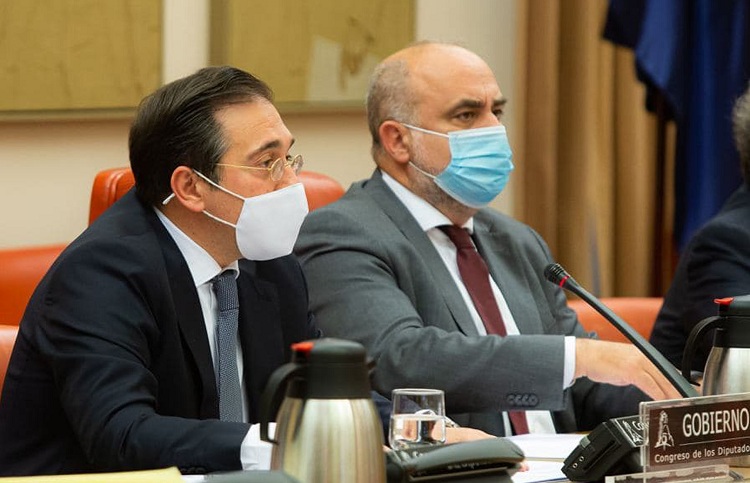The Diplomat
The Minister of Foreign Affairs, José Manuel Albares, yesterday summoned the Russian ambassador in Madrid, Yuri Korchagin, to convey to him “Spain’s rejection of the unilateral actions” of his government, according to the head of Spanish diplomacy in the Congress.
This morning, after the Russian invasion began, Albares wrote on his Twitter account: ‘The unjustifiable Russian attack on Ukraine is a flagrant violation of international law’. He also condemned the “aggression”, called for it to cease and stated that Spain is coordinating with its partners in the EU and its allies in OYTAN to respond to it. He also expressed his solidarity with the government and people of Ukraine.
The President of the Government, Pedro Sánchez, and the rest of the European leaders will participate today in an extraordinary European Council to address the crisis in Ukraine.
The conflict between Russia and Ukraine is “the greatest threat to the security of Europe in recent decades”, the minister said during his appearance before the Foreign Affairs Committee of the Congress, at his own request, to address the crisis in Ukraine. It is a “very serious crisis that can provoke a before and after” because “the scenario of Russia invading Ukraine is not at all out of the question” and because “we are, quite possibly, facing the largest military deployment since the Second World War and a threat that does not only concern Ukraine”, he continued.
For this reason, he warned, “Spain cannot not get involved” because “a military aggression would constitute a very serious violation of international law with unforeseeable consequences” and what happens in the coming days and weeks could mean “the end of a European era of peace and stability and the beginning of a new era in which insecurity and conflict become a structural element in our continent”. For all these reasons, he warned, “it is time to demonstrate that we are a committed country, which is there when it is expected and whose commitment to our principles and values, to our partners and allies, is unwavering”.
In these circumstances, Albares called for “unity and state policy” to all political forces in the face of the Ukrainian crisis because it is necessary “to choose whether they are with peace and international legality or with the use of force and world disorder”. “The Government chooses the first path” and will continue to bet on dialogue, but “Russia is making it very difficult if not almost impossible,” he said.
Summons to the Russian Ambassador
Likewise, Albares informed the MPs that – as other European governments did on Tuesday after the decision of Vladimir Putin’s government to recognize the self-proclaimed republics of Lugansk and Donetsk and to order the deployment of troops in these Ukrainian territories – yesterday he had summoned the Russian ambassador, Yuri Korchagin, to convey “Spain’s rejection of the unilateral actions contrary to international law that his government is carrying out”.
As reported by the Russian Embassy in a press release, Korchagin took advantage of the meeting to show Albares “Russia’s official position on the matter” and ask him to explain “what Spain gains from not recognizing Russia’s legitimate concerns, related to the principle issues of our country’s security”. “We look forward to receiving the answer,” the note concludes.
Meanwhile, the Ukrainian Chargé d’Affaires in Madrid, Dmytro Matiuschenko, in statements to Europa Press, asked the Spanish government for more bilateral commitments and, given that “declarations do not protect against bullets”, called for the sending of practical aid, including personal protective equipment, with which to respond more effectively to the “aggression” undertaken by Russia.
PP and Podemos
In her speech in the Congress, the PP Secretary for International Affairs and Foreign Spokesperson in Congress, Valentina Martínez Ferro, showed her group’s support for the Government “to fulfill its obligations within the framework of the EU and NATO”, because it is necessary “to present a common front of solidarity with Ukraine” and that partners and allies remain “firm and determined in facing the challenge of border revision being carried out by the Russian Government”. However, she expressed his doubts as to whether the delivery of humanitarian aid to Ukraine – announced the day before by Albares – will be “sufficient” instead of the delivery of military material and asked Albares whether he thought that sanctions were sufficient or whether other “massive” measures would be needed.
For his part, Gerardo Pisarello, MP of Unidas Podemos (PSOE’s government partner) regretted the “warmongering and exalted discourse” of international leaders, with special mention to NATO Secretary General Jens Stoltenberg, although he admitted that the fact that Putin “has violated international law and drastic sanctions have been announced is not good news”. For this reason, he insisted, “as never before”, on the defense of the diplomatic route to “avoid a chain reaction”.
Extraordinary European Council on Ukraine and Russia
On the other hand, the President of the Government, Pedro Sánchez, will participate today in Brussels together with the rest of the leaders of the EU-27 in an extraordinary EU summit to deal with the crisis in Ukraine. “The use of force and coercion to change borders has no place in the 21st century,” said the President of the European Council, Charles Michel, in his letter of invitation.
“The aggressive actions of the Russian Federation violate international law and the territorial integrity and sovereignty of Ukraine and also undermine the European security order,” he continued. Therefore, “it is important that we remain united and determined and jointly define our collective approach and actions,” he added. Michel’s proposed agenda includes a review of recent developments and the search for ways to protect “the rules-based international order,” to deal “with Russia, in particular by holding it accountable for its actions,” and to “continue to support Ukraine and its people.”






